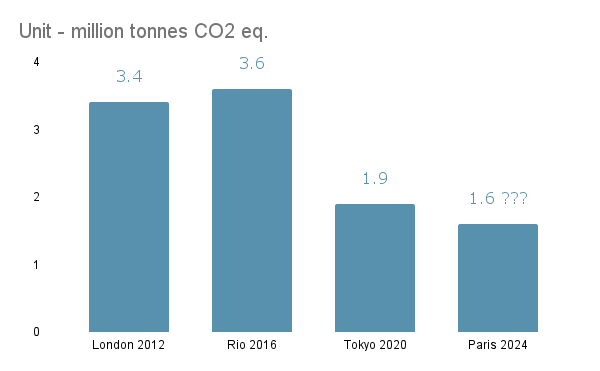Paris 2024 Olympics: A Leap Towards Sustainable Games with AI and Carbon Reduction Strategies
- Neelima K
- Jan 29, 2025
- 4 min read

As the world becomes increasingly aware of climate change, the question of whether large-scale events like the Paris Olympics can be truly sustainable has sparked considerable debate. Historically, the Olympics have left a significant carbon footprint, with past Games contributing to substantial environmental impact. For instance, the Tokyo 2020 Olympics produced 1.9 million tonnes of CO2 equivalent, while London 2012 had an even larger footprint of 3.4 million tonnes.
In response to growing concerns, the Paris 2024 Olympics has set an ambitious target to limit its carbon footprint to 1.58 million tonnes of CO2 equivalent. This represents a 50% reduction compared to the emissions from London 2012 and Rio 2016. To put this into perspective, 1.58 million tonnes of CO2 is roughly equivalent to the annual emissions of about 343,478 cars.

Breakdown of Carbon Footprint in Previous Olympics
Olympic Games, with millions of visitors and complex infrastructure, have historically faced challenges in managing their environmental impact. The largest contributors include:
Construction: New venues, Olympic villages, and temporary facilities generate substantial emissions.
Energy Use: Powering these venues and ensuring smooth operation during the event requires massive amounts of energy.
Transportation: Moving millions of people, athletes, staff, and spectators adds to the carbon footprint, particularly when air travel is involved.
Waste and Materials: Food, water, single-use plastics, and other consumables used during the Games create significant waste.
Below is a breakdown of the carbon budget for the Paris Olympics.

Tackling the Carbon Footprint
Paris 2024 sought to break the trend by focusing on key areas that had historically driven emissions. First, the use of renewable energy was at the forefront, with all power for the Games coming from wind and solar farms in France. This approach not only cut down on fossil fuel use but also integrated the Games into the city's broader goal of transitioning to renewable energy sources by 2030.
Additionally, 95% of the venues for the Paris Olympics were either pre-existing or temporary structures, drastically reducing the need for new construction—a major driver of emissions in past Olympics. Even the new Paris Olympic Aquatic Centre was designed with sustainability in mind, featuring a concave roof that reduced the space needing heating by 30% and solar panels that covered 20% of its energy needs.
Paris also addressed food and waste, aiming to make 60% of the meals plant-based and sourced locally. These efforts to reduce meat consumption came with trade-offs, as many athletes expressed concerns about the strict dietary limitations. Meanwhile, organisers committed to halving single-use plastics compared to London 2012 and recycling materials such as furniture and even the beds used by athletes.
AI: A Secret Weapon for Sustainability
One of the most exciting innovations at Paris 2024 is the use of AI to monitor and reduce energy consumption. More than 100 smart electric meters are deployed at key key venues to collect real-time data on electricity consumption. Through digital twin technology, the Games will simulate energy use in real-time and provides recommendations to optimize power demand and reduce waste. This isn't just about cutting costs; it's about minimising waste and making data-driven decisions that will influence future Olympics.
Another tool, the Climate Coach for Events, provides customised suggestions to help event organizers lower their carbon footprint. This AI-driven platform is part of a broader effort to make the Games not just an exciting spectacle but also a blueprint for how technology can support sustainable events.
The Impact of Climate Change on the Olympics
Climate change is making a tangible impact on the Olympics. As global temperatures rise, athletes increasingly face extreme heat, putting their performance and safety at risk. Events like marathons have been relocated to cooler times or cities to protect participants, and winter sports struggle with shortened seasons due to warming temperatures, forcing artificial snow use. The International Olympic Committee has delayed its decision to select Winter Games host cities for 2030 and beyond because of the uncertainty of winter sports. As these challenges grow, questions arise about the future of such large-scale events and how they can adapt while maintaining the excitement and tradition people love.
Can Paris Reach Its Sustainability Targets?
The answer isn't simple. While Paris has implemented a range of innovative measures, the sheer scale of the event means that some emissions are unavoidable. the expected carbon footprint of the 2024 Olympics is 1.6 Mt CO2 eq for 13 to 16 million visitors, or around 100 to 125 kg CO2 eq per person. For example, 100 kg eq CO2 is equivalent to the emissions generated by travelling 500 km by car or 10,000 km by metro, or consuming 31 beef burgers or 83 bottles of wine.
Critics argue that the carbon reductions from initiatives like plant-based meals and recycled materials may not offset the overall environmental impact of hosting millions of visitors. Others, however, see the Paris Olympics as a stepping stone toward truly sustainable mega-events, where technology, renewable energy, and innovative practices work together to decouple economic growth from environmental harm.
Conclusion
Large events like the Paris Olympics present undeniable challenges in achieving sustainability. However, the Paris 2024 Games show that it's possible to attempt a balance between global celebration and environmental responsibility. By leveraging AI, renewable energy, and innovative design, the event is setting a precedent for future sporting events.
While mega-events like the Olympics contribute to economic growth, organizing them in a sustainable way could help decouple economic benefits from environmental harm—a much-needed shift for the future.
Have you attended the Paris Olympics? If so, did you notice any sustainable initiatives in action? Share your experience in the comments below!



Comments